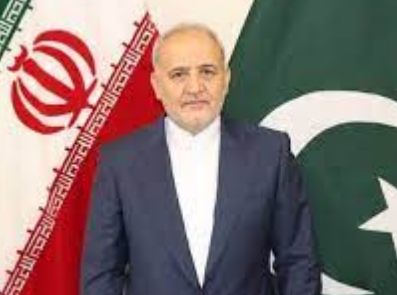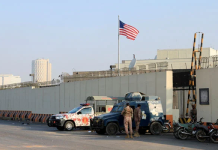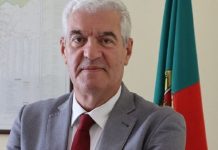ISLAMABAD, MAR 15 (DNA) — Ambassador of Iran to Pakistan, Dr . Reza Amiri Moghadam on Thursday said that there is a strong possibility that the bilateral Free Trade Agreement (FTA) will be finalized in the upcoming visit of the President of Iran, Ebrahim Raisi to Pakistan, which is likely to increase the mutual trade between the two countries.
From the upcoming visit of the Iranian president to Pakistan, there will be several bilateral economic and trade agreements between the two countries, which will further strengthen the mutual economic and trade relations and promote the bilateral business between the two countries, Dr. Reza Amiri Moghadam said this in visit to Islamabad Chamber of Commerce and Industry on the invitation of President ICCI, Mr Ahsan Zafar Bakhtawri here in Chamber house.
The Iranian ambassador said that the current bilateral trade volume between Pakistan and Iran is $2.5 billion, which has increased by 11 percent in the last 11 months.
The Ambassador said that after the FTA and bilateral agreements between the two governments for the promotion of mutual trade, there is a strong possibility of doubling the mutual trade between Pakistan and Iran to reach $5 billion in the next few years. He said that the Pakistan-Iran gas pipeline is a huge facility for the people of Pakistan on behalf of the government of Iran, which will benefit both the domestic and industrial sectors of Pakistan.
He said that Iran is serious about resolving Pakistan’s energy problems and that is why Iran completed the Pakistan-Iran gas pipeline project in 2009 to the border of Pakistan, which cost Iran $1 billion, so that Pakistan could meet its energy needs. It could be done, but it is still waiting for its completion from the Pakistan side.
Iranian Envoy said that Iran is already trading with Turkey, Turkmenistan, Iran and Azerbaijan in the sector of energy and gas and Pakistan can also adopt the procedure adopted with these countries. Dr. Reza Amiri said that the banking channel in Pakistan and Iran is a big issue, but Iran has a banking channel with Turkey, Bahrain and Iraq, Pakistan can follow this procedure.
He said that Pakistan and Iran need to have strong air, maritime and sea links, which will strengthen the economic relations between the two countries and Pakistan will also be connected to regional and global trade. The Ambassador emphasized on the closeness of maritime links between the two countries, especially Karachi and Gwadar and Chabahar and Bandar Abbas ports and said that Gwadar and Chabahar should be declared as sister ports.
He said that this era is the era of economic and trade links and it will take time for Pakistan and Iran to connect with regional and global trade through these ports.
He said that Pakistan-China Trade Corridor and BRI projects also have strong prospects for economic and trade integration between Pakistan and Iran, which both countries need to work on. He said that the world is currently being connected to each other through various economic and trade corridors and Pakistan and Iran can make their place in the global trade market by connecting to the North-South and East-West trade corridors.
He said that with this both countries can be connected not only to regional trade, especially Central Asia, but also connect to European markets. He said that Pakistan and Iran can fulfill 70 percent of each other’s needs by engaging in mutual trade, just as Iran imports halal meat, Pakistan can do a lot of work in Iran in this sector.
The Iranian ambassador said that Iran is issuing electronic visas to Pakistan businessmen while making visas easier. He said that the relations between the business community of Pakistan and Iran, especially Islamabad Chamber of Commerce and Industry and Tehran Chamber of Commerce and Industry, should be further improved.
Meanwhile addressing to the forum, President Islamabad Chamber of Commerce and Industry, Ahsan Zafar Bakhatwri said that Pakistan and Iran’s trade volume exceeds $2.5 billion annually, with Pakistan selling rice and other products to its neighbor, while people living in the border area of Balochistan save money by buying Iranian food and goods from traders across the border.
He said that as part of a five-year trade cooperation plan for 2023-2028, Pakistan and Iran aim to increase annual trade volume between the two countries to $5 billion. President ICCI said that the two countries are also members of various regional and international fora such as the Economic Cooperation Organization (ECO) and the Organization of Islamic Cooperation (OIC).
Iran’s forthcoming full membership in the Shanghai Cooperation Organization (SCO) further facilitates expanded interaction and collaboration between Pakistan and Iran. He said that fostering deeper people-to-people exchanges and cooperation in science and technology will be pivotal.
Ahsan said that Infrastructure improvements are crucial to facilitate increased barter trade, while the issue of high tariffs from the Iranian side and the absence of credible payment mechanisms need to be resolved. Meanwhile addressing the gathering organized by ICCI, Secretary General, United Businessman Group Zafar Bakhtawri and Chairman Founder Group ICCI, Khalid Iqbal Malik also highlighted the different aspect of Pakistan Iran ties. — DNA

















